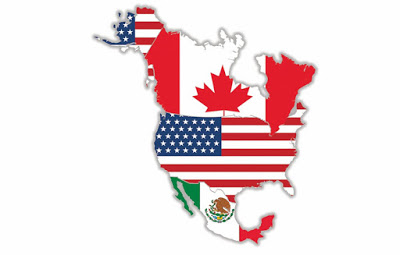In a politically charged atmosphere, Canada and the US sat on the negotiation table on Wednesday to parley
on how to salvage the North American Free Trade Agreement (NAFTA).
on how to salvage the North American Free Trade Agreement (NAFTA).
President
Donald Trump’s repeated threats to leave Canada on the
side-lines and proceed with Mexico, are which reached a deal with
Washington last week and could sign NAFTA 2.0 as soon as November 30.
Donald Trump’s repeated threats to leave Canada on the
side-lines and proceed with Mexico, are which reached a deal with
Washington last week and could sign NAFTA 2.0 as soon as November 30.
Amid rising optimism last week that an agreement would soon be finalized on a rewrite of the 25-year-old
trade deal, inflammatory comments from Trump angered officials in Ottawa and the discussions ended Friday with no agreement.
trade deal, inflammatory comments from Trump angered officials in Ottawa and the discussions ended Friday with no agreement.
And Trump continued his tough talk throughout the weekend.
“There is no political necessity to keep Canada in the new NAFTA deal. If we don’t make a fair deal for
the US after decades of abuse, Canada will be out,” he tweeted.
the US after decades of abuse, Canada will be out,” he tweeted.
“Congress should not interfere with these negotiations or I will simply terminate NAFTA entirely & we will
be far better off.”
be far better off.”
The White House notified Congress on Friday of its “intent to sign a trade agreement with Mexico — and Canada,
if it is willing — 90 days from now.”
if it is willing — 90 days from now.”
The White House has until September 30 days before it must present the full text of the new agreement to
Congress, which will give Ottawa and Washington time to iron out remaining differences.
Congress, which will give Ottawa and Washington time to iron out remaining differences.
But legislators and trade law experts have warned that Trump does not have the authority to supplant the
three-nation NAFTA with a bilateral pact with Canada.
three-nation NAFTA with a bilateral pact with Canada.
Foreign Minister Chrystia Freeland is due to return to Washington for talks with US Trade Representative
Robert Lighthizer on Wednesday morning.
Robert Lighthizer on Wednesday morning.
Both officials said there had been progress in the negotiations last week, which frequently went late into
the night.
the night.
But Prime Minister Justin Trudeau stressed Tuesday that no NAFTA is better than a bad deal for Canada, and
he will insist on retaining the dispute mechanism in Chapter 19 that provides binational panels to resolve disagreements.
he will insist on retaining the dispute mechanism in Chapter 19 that provides binational panels to resolve disagreements.
“We will hold firm on that,” Trudeau said in Vancouver.
“We will not sign a deal that is bad for Canadians, and quite frankly, not having a Chapter 19 to ensure
that the rules are followed would be bad for Canadians.”
that the rules are followed would be bad for Canadians.”
Canada has used the mechanism to fight off US antidumping duties.
After
the US and Mexico reached an agreement on new rules for auto trade, and
tougher protections for workers
and intellectual property, talks with Canada were hung up on the
mechanisms used to resolve disputes among partners, and on Ottawa’s
strictly controlled dairy sector.
the US and Mexico reached an agreement on new rules for auto trade, and
tougher protections for workers
and intellectual property, talks with Canada were hung up on the
mechanisms used to resolve disputes among partners, and on Ottawa’s
strictly controlled dairy sector.
Mexican officials stressed in a joint statement that they are “continuing to promote an agreement to which
Canada is a party.”
Canada is a party.”
But they also have said that either way they are protected with a bilateral deal with the United States,
while Mexican businesses also have said they would support a two-nation deal.
while Mexican businesses also have said they would support a two-nation deal.
A Canada-less deal “is not the ideal scenario, but it’s better than ending up without any agreement at all,
it’s better than living in uncertainty,” said Gustavo de Hoyos, the president of the Mexican Employers’ Association (COPARMEX).
it’s better than living in uncertainty,” said Gustavo de Hoyos, the president of the Mexican Employers’ Association (COPARMEX).
But the US business sector strongly prefers NAFTA remain a trilateral agreement.
“Anything other than a trilateral agreement won’t win Congressional approval and would lose business support,”
warned Thomas Donohue, president of the US Chamber of Commerce.
warned Thomas Donohue, president of the US Chamber of Commerce.
And in a rare show of common cause, AFL-CIO president Richard Trumka also supports a trilateral NAFTA.
He said it was “pretty hard to see” how efforts to revamp the pact would work “without having Canada in
the deal.”
the deal.”
Minutes later, Trump lashed out at the labor leader on Twitter for “poorly” representing his union and making
comments that were “against the working men and women of our country, and the success of the US itself.”
comments that were “against the working men and women of our country, and the success of the US itself.”





